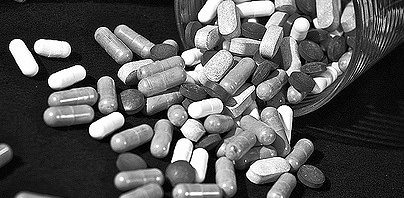It makes you happy. You get cranky when you don’t have enough of it. Once you’ve gotten used to a certain amount, you need more to sustain you.
It’s sugar.
https://www.flickr.com/photos/aigle_dore/15061081508/in/photolist-oWTYP7-7Rzjvt-SgTksS-RAqXjh-db4bFZ-bgCJXR-4Ttyd-5xJ9ia-qT2w29-8XU25X-qV93uz-dPwY8F-eZSrCo-bokhS-eS48q2-7uwcBh-83NGkg-5UQJst-D5Zd5u-6iCrMx-aE3eu1-eS49Wr-GfLnxJ-bDkQ9f-qvRtka-8wosVJ-agZ1Fc-RRMVL3-P7QnvQ-5HBEhR-dKUYyC-49uNjV-6qyFYF-2w5pPA-a4kVzJ-R8LBak-qgEx9Z-83rthB-a3JXHQ-79agu-5zL5QF-4zeYaK-92rKRY-4zjbBj-8geE8J-r1kfED-7TZF84-s9SHbE-6SQjJy-fQyfyV/
The way that sugar works on our brain chemistry is very similar to that of other drugs of abuse—it can cause one to become addicted to sugar . It affects our dopamine systems, flooding the brain with this feel good chemical and inducing a high. Picture the stereotypical child with an ice cream cone.

To compensate for this large amount of confusing dopamine, the overwhelmed brain will turn off its dopamine receptors. The only problem with this is that the brain doesn’t always realize to turn the dopamine receptors back on. This causes a withdrawal, because without the registration of dopamine, you feel unhappy—cranky even.
We can also develop a tolerance for sugar. The brain learns not to get too happy from this extra dopamine, and the dopamine receptors are regulated so that they need a higher concentration of dopamine in order to register. You know the experience where you try eating the bright blue frosting on a child’s birthday cake and can’t stomach it because of the sweetness? Yet most kids could eat three pieces without a problem. They have a higher tolerance.

Yet sugar is different from drugs of abuse. We let kids have it, and reward them with it. It’s socially acceptable to be addicted to sugar here. Sugar is in almost all of our food, and it is perfectly fine to have three meals a day with snacks in between. Half of the time in America, we don’t even realize that we’re consuming so much sugar. It is hidden in ingredients lists, and corporations want to keep us in the dark. If we’re addicted to a substance, we are more likely to keep buying items that have that substance in it.
Like I said, you might be addicted to a drug, and you didn’t even know it. You didn’t even really have control of this addiction—especially if you didn’t know about its side effects, or that you could become addicted to it in the first place.
Sugar addiction isn’t a huge problem at first, but like most drugs of abuse, it can lead to some serious health problems down the road. For instance, high sugar intake can help lead to heart and liver disease, diabetes, and even cancer.
I don’t mean to guilt trip you because of your addiction, but maybe realizing how easy it was for you to become addicted to sugar will help give you some empathy for those addicted to drugs of abuse—people that need real help, and not dirty looks and an overabundance of acquisitions.
You’re Addicted to a Drug, and You Might Not Even Know It
